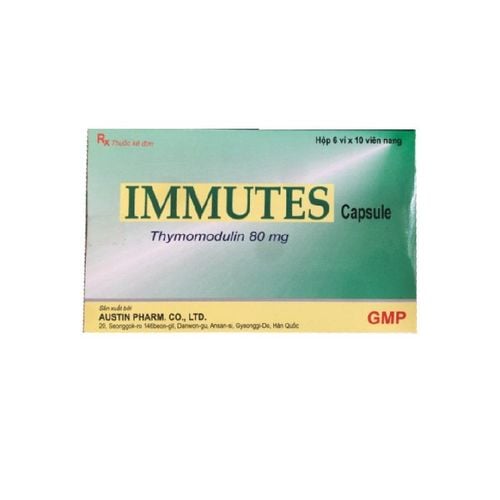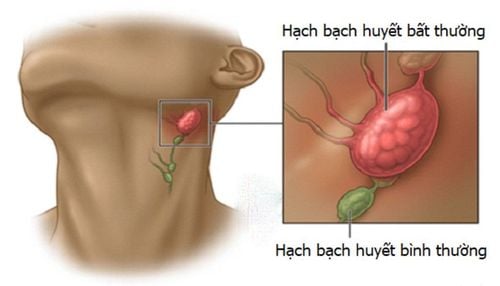This is an automatically translated article.
Espstein-Barr virus EBV (EBV) is a virus belonging to the Herpes family, this is the most common virus in the world. According to some studies, more than 90% of adults have been infected with EBV virus. Performing an EBV test helps to find out if EBV is present in the blood.
1. What is EBV?
EBV is a virus that is transmitted from person to person through saliva, which is why it is also known as the kissing disease. EBV can also be transmitted through genital secretions. The disease usually has no signs or symptoms that are different from those of children with normal acute viral infections.
Approximately 30-50% of adult patients present with mononucleosis, including fatigue, malaise, fever, swollen lymph nodes, headache, and splenomegaly. .... EBV virus is also associated with lymphoproliferative disorders or possibly some cancers, such as nasopharyngeal cancer, Hodgkin's lymphoma, gastric cancer, Burkitt's lymphoma.... with immunocompromised patients.
EBV includes 2 main types, EBV type 1 and EBV type 2 . The difference between the two is the EBNA-3 gene. The reason why the transformation ability and the activation ability of these two types are different is due to this difference.
To diagnose whether a patient is infected with EBV virus in the acute stage or has been infected or relapsed, the doctor will order an EBV test.

Virus EBV có thể là nguyên nhân gây ung thư mũi họng
2. EBV . Test
To determine if the EBV virus is present in the blood, a number of immune system tests that evaluate for EBV can be performed, including:Perform an antibody test to the viral IgM antigen: VCA IgM can appear early and disappear in 4-6 weeks, can persist for several months in patients with acute EBV infection. Perform virus IgG envelope antigen antibody test: EBV VCA IgG can reach the highest level in the 2nd - 4th week after the onset of the disease and gradually decrease over time and persist for life. VCA IgG may present at the same time as IgM, EBV VCA IgG may also present early in patients with acute EBV infection. Do an anti-D antibody test early: anti-EA-D IgG antibodies may increase within the first 3-4 weeks and after 3-4 months may disappear. Although this may not happen often. In some cases, the presence of anti-EA-D IgG antibodies is also a sign that you have been infected with an active EBV virus. Anti-EA-D antibodies can also persist in healthy people for many years, this prevalence is close to 20%. Perform antibody test against Epstein Barr mononuclear antigen: EBNA-1 IgG will not appear in the acute phase of EBV infection during the first 3 - 4 weeks by immunofluorescence. However, after about 2-4 months from the time of symptom onset, EBNA-1 IgG will gradually appear and persist. Therefore, EBNA-1 IgG is considered one of the indicators when the EBV infection has passed. EBNA-1 IgG will usually be negative or have low levels in patients with chronic EBV infection or with a weakened immune system.

Xét nghiệm kháng thể kháng nguyên để chẩn đoán bệnh EBV
3. When is the EBV test ordered?
EBV testing is indicated in the following cases:
Patients present with symptoms similar to those of mononucleosis, including: fatigue, swollen lymph nodes, headache, fever, spleen to... Determine if the patient has ever been exposed to the EBV virus. When pregnant women develop flu-like symptoms, their doctor will perform tests to diagnose whether the cause of those symptoms is the EBV virus. To monitor how the antibody level changes, the doctor will perform this test over and over again in the event that the first test is negative but the patient is suspected of having EBV infection.
4. Meaning of EBV . Test
The result obtained when performing an EBV test is to determine the presence of antibodies against the antigen of the EBV virus.In the body, there are antibodies if the result is positive, and if it is negative, it means that there is no presence of antibodies or the antibody is still low so it cannot be detected through the test. experience. Antibody titers in the patient's body can also be determined through this test.
Some immunoglobulin antibodies can also be detected through this test. Identifying antibodies helps diagnose when the infection occurs. In the acute stage of EBV infection, IgM antibodies can be found, this is also the stage in which mononucleosis is active. About 3-4 weeks after infection with the virus, IgG antibodies can be found.
About 3 days after the test, the results will be obtained.
For normal people, the titre will be smaller and between 1 and 10 (1:10). You have never been exposed to the EBV virus and the EBV VCA IgM antibody is negative if the standard titer is less than 1:10. If you have been exposed to EBV in the past, IgG will be present.
In case the titre is greater than 1 to 10 but less than 1:320, it means you have been infected with EBV in the past. You have an active EBV infection or mononucleosis if the titre is 1:320 or higher. In this case, the EBV VCA IgM antibody is usually positive.
Vinmec International General Hospital is one of the hospitals that not only ensures professional quality with a team of leading medical doctors, modern equipment and technology, but also stands out for its examination and consultation services. comprehensive and professional medical consultation and treatment; civilized, polite, safe and sterile medical examination and treatment space. Customers when choosing to perform tests here can be completely assured of the accuracy of test results.
Customers can directly go to Vinmec Health system nationwide to visit or contact the hotline here for support.













